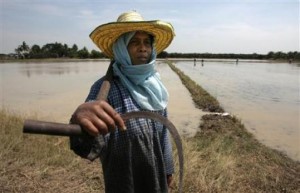
Bangkok Post | 31 August 2009
Many farmers feel forced to sell their land because of debts, while others are just tired of the hard physical labour
Writer: Phusadee Arunmas
Palong Piroomyu, a 52-year-old farmer from Bang Len in Nakhon Pathom province, is preparing to sell his portion of farmland to a Bangkok-based buyer.
He's not concerned about who the buyers are or that some may even be quietly representing foreigners. The fact is, Mr Palong is desperate for money to repay the debts he owes to the Bank for Agriculture and Agricultural Co-operatives (BAAC). His land could be worth up to one million baht.
Mr Palong is not the first or last Thai farmer forced to dispose of land inherited from his ancestors to repay debts. Many more are likely to make similar decisions as long as the market does not belong to producers, the country's infrastructure, particularly the irrigation system, remains undeveloped, and annual returns fail to cover production costs and rising costs of living.
A number of farmers have willingly sold land to individuals, factories or property developers to repay debts, finance their children's education or pay for daily expenses.
"Thai farming is the cursed career," says Mr Palong. "Thirty or 40 years ago, one tonne of paddy was equivalent to one-baht weight of gold (15.16 grammes). But now paddy fetches only about 7,000 baht per tonne, or half of gold prices that now stand as high as 15,000 baht."
Mr Palong said several of his fellow farmers had left to work in factories and cities with the relative stability of fixed wages, away from the high risks of rice farming.
"Most Thai farmers who send their kids to get higher education generally tell them to stay away from rice farming as it's back-breaking work with a high exposure to price fluctuations."
Even though Thailand is one of the major food exporters of the world, its agricultural productivity is less than one-tenth that of the most productive countries such as New Zealand, Australia and the United States. And even though more than 50% of the Thai workforce of about 35 million work in the agricultural sector, it contributes only 10% to gross domestic product.
According to the Agricultural Economics Office, there are 5.79 million households in the farm sector with an average of 22.93 rai per family.
Farmers who own their own land represent only 40% of the total arable land, with rice farming estimated to account for 67 million rai or 57% of the total area.
"The money is enticing and we don't know how to refuse such lucrative offers from foreigners or their brokers to rent or buy land since many Thai farmers are struggling to make ends meet," said Mr Palong.
A growing population and economic pressures on land and water contributed to a global food crisis in 2007-08, sending prices spiralling and some already impoverished populations went hungry. Several food-producing nations restricted exports of certain staples and governments everywhere began to rethink their food security policies.
The food price scare, which for now has receded with falling commodity prices dragged down by the global recession, has pushed many oil-rich and food-poor Arabian Gulf states to seek long-term lease rights to overseas farmlands.
The Gulf states, which last year imported 80% of their staple foods at a cost of US$20 billion, have shown an increasing interest in Southeast Asian farmland, including Thailand.
Though a recent probe by the Department of Special Investigation found no foreign farmland grabs, many feel there is implicit foreign ownership in domestic farmland through Thai nominees. "The Land Act and Foreign Business Act bar foreigners or foreign companies from land ownership rights in Thailand, but right now there are several nominees of foreigners who own land rights," said Nipon Poapongsakorn, president of the Thailand Development Research Institute (TDRI).
"This is purely due to weak legal enforcement. We have to look into a company's registration and shareholding structure if we really want to revamp this issue."
According to Dr Nipon, in developed countries, most governments strictly bar foreigners from owning land rights as price speculation might drive up prices, leaving local people unable to afford land, and when the bubble finally bursts it can even leave some homeless.
Politically, he said, it would be tougher for local governments to change policies, particularly the land tax, as it would face strong opposition from cash-rich and powerful foreign land owners.
More importantly, those rich foreigners would develop and demarcate their land, preventing local people from entering their areas.
"We should distinguish clearly between allowing foreigners to take control of land and land leasing. Authorities see no need to bar foreigners who want to lease our lands and import high technology to raise our agricultural productivity, create jobs and make use of derelict and uninhibited areas. Higher production efficiency would raise our country's revenue and produce more food at cheaper prices for both Thais and global consumers."
Dr Nipon believes, though, that there is no need for Thailand to fear foreign investment in the farm sector, given that Thai agriculture is developed and competitive. "The core problem is that Thai people themselves no longer want to make a living in agriculture as they know how hard farming is," he said.
Chakun Sangraksawong, deputy permanent secretary for the Agriculture Ministry, said foreigners, if they were allowed to invest in agriculture, must not invest in production but instead processing because it needs high-technology imports and expertise.












